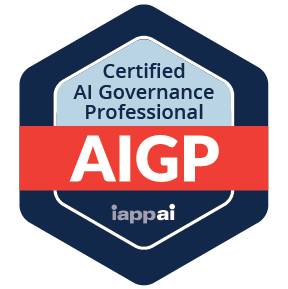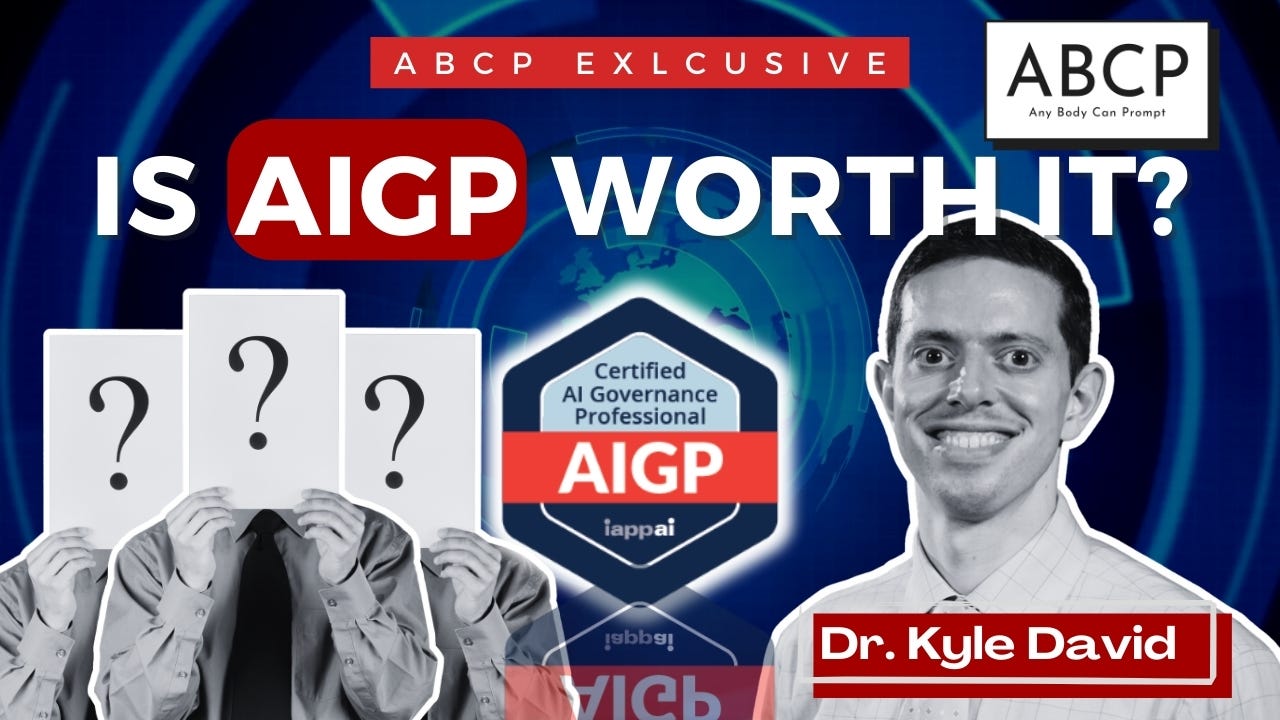AI Governance Professional (AIGP) Certification: Is It Worth it?
A Candid Conversation with Dr. Kyle David
Have you been hearing about AIGP a lot but aren't sure what it is? Are you unsure whether or not to take the AIGP exam? Is AIGP the only option out there? Is it worth it? No worries - the godfather of AIGP- Dr. Kyle David is here to answer all your questions!
The Artificial Intelligence Governance Professional (AIGP) certification is a new credential offered by the International Association of Privacy Professionals (IAPP). It demonstrates expertise in responsible AI governance, including ethical development and deployment of AI systems.
The AIGP exam assesses knowledge across 7 domains related to AI foundations, impacts, regulations, and governance frameworks. These 7 domains are:
Domain I – Understanding the Foundations of Artificial Intelligence
Domain II: Understanding AI Impacts on People and Responsible AI Principles
Domain III: Understanding How Current Laws Apply to AI Systems
Domain IV: Understanding the Existing and Emerging AI Laws and Standards
Domain V: Understanding the AI Development Life Cycle
Domain VI: Implementing Responsible AI Governance and Risk Management
Domain VII: Contemplating Ongoing Issues and Concerns
AIGP BODY OF KNOWLEDGE AND EXAM BLUEPRINT
IAPP AIGP CANDIDATE HANDBOOK 2023
Dr. Kyle David is a privacy and AI governance expert who has created one of the most popular AIGP exam preparation courses on Udemy. With a PhD from UC Irvine and nearly 20 years of teaching experience, Dr. David brings an interdisciplinary approach to explaining complex AI governance concepts.
We had the opportunity to interview Dr. David about the AIGP certification and his thoughts on preparing for the exam. Here are the key highlights from our discussion:
Q 1. Your course on AIGP is approaching 1000 students, and according to the IAPP President and CEO, over 4,000 professionals had already signed up for the AIGP training curriculum in Mar'24. Clearly, AIGP is gaining immense popularity. Is AIGP certification the ONLY globally recognized certification option available as of July'24 to become a certified AI governance or a responsible AI professional?
Wow! These are amazing statistics! I did not know that many folks had registered for IAPP’s training. To the best of my knowledge, IAPP’s AIGP certificate is the only, well-rounded certification at present for folks on the market for AI governance professional jobs. I know of two other certificates. One by an unfamiliar organization. The other is ISACA’s “AI Fundamentals Certificate,” which is not nearly as comprehensive as IAPP’S AIGP. My hunch is that there will be comparable certifications in the future. With that said, IAPP has done a great job putting together a well-rounded body of knowledge that combines the technical, legal, and governance knowledge and skills necessary to succeed in this space. They have absolutely set the bar in this space.
Q 2. AIGP Certification seems to be quite expensive. Do you think it's worth the investment? What are some alternative ways for someone to demonstrate expertise in responsible AI if they can't afford the course?
I can’t speak to IAPP’s official training. I understand it is expensive and the reviews have not been great. Nevertheless, for folks new to AI, the AIGP body of knowledge provides a great blueprint that outlines the knowledge and skills necessary to succeed as an AI governance professional. That is, it combines a technical understanding of AI technology and the AI development life cycle with governance best practices and foundational legal and regulatory knowledge.
As for an alternative to IAPP’s official training, as I was reading through the reviews of folks that took the course, I realized that the IAPP training alone does not adequately prepare you to sit the exam. Folks had therefore begun scouring the internet for the requisite sources and knowledge needed to pass the exam. Many folks have kindly shared their lists, which has resulted in the availability of numerous bibliographies and website compendiums. These would be the “free” alternatives to IAPP’s official training.
The issue here, of course, is that there’s an enormous time tax on folks that pursue this option. That is, it’s up to the individual themselves to invest the time necessary to sort through and curate all this information. I know about this time tax first-hand because this is the approach I took to prepare for the exam. The difference, however, is that I created my Udemy AIGP Certification Masterclass as I was preparing for the exam. Using that material, I comfortably passed the exam.
Q 3. If a data scientist and a legal professional start preparing for this certification at the same time without prior background knowledge, who would need to put in more effort? In your experience, is it more difficult for data scientists to learn the regulatory aspects or for legal professionals to learn AI concepts from an AIGP prep perspective? How did you maintain that balance in your course?
I think both professions have their own advantages. Data scientists will ace domains 1 (technical aspects of AI) and 5 (AI development life cycle). Legal folks will ace domains 3 (current legislation), 4 (emerging legislation), and 7 (future issues). They’d likely do equally well in domain 6, which focuses on governance. The AIGP body of knowledge is ten miles wide, but only one inch deep. I use this phrase a lot throughout my course. What I mean by this is: you need to know a lot of information about many different topics to pass. However, you don’t need to know these topics in much depth. So, to answer your question, I don’t think any one of those professions has a substantial advantage over the other for the exam.
Q 4. There are a few negative reviews online around AIGP certification mentioning issues like out-of-syllabus content, typos, and poorly written questions with no correct answers or wrong answers listed as the best option. Is there any truth to these concerns? How can these issues be addressed in your opinion?
To be fair to IAPP, the AI space is moving very, very quickly. This will be an ongoing challenge for any certification body for the near future. One issue restricting the IAPP’s ability to quickly update its body of knowledge is the NSI National Accreditation Board, which accredits all the IAPP’s certifications. My understanding is that this accreditation body requires that the IAPP give certificate seekers no less than 3 months’ notice when updating its body of knowledge and exams. That is, even if IAPP updated everything today, that new content would not show up on the exams for at least 3 months. Recently, IAPP has released updated bodies of knowledge for its other exams sometime around March or April of each year and implemented those changes on the exams in September or October, which is a difference of about 6 months. Moving forward, I feel that instructors in this space need to be lean, agile, and capable of moving quickly.
Q 5. Given the rapid pace of AI development and evolving regulations, how do you ensure that your course content remains up-to-date and relevant? How often do you update the material?
I will update my courses as often as necessary to ensure that my students are prepared to test with confidence. Because IAPP complies with the accreditation body’s requirement to give at least 3 months’ notice, I have plenty of time to ensure that my courses are up to date once the body of knowledge is updated.
Q 6. If you were part of the AIGP exam committee, what changes would you propose to improve the exam?
My first course of action would be to clean up domain 6. In addition to there being a lot of repetition, there are some discrepancies and inconsistencies in the terminology. Additionally, many of the concepts are quite abstract. The body of knowledge requires students to memorize questions rather than practical application of those questions. Because I learn best through concrete examples, another step I would take would be to incorporate real-world case studies to help the students learn more effectively. I try to do this as much as possible in my Udemy course.
Q 7. What advice do you have for budding AI governance professionals or people planning to take the AIGP exam in the coming months?
Don’t be intimidated by the technology or the fast-moving pace of the legal and regulatory landscape. Jump in and start learning as soon as you can. Together we can chart a path to ensure that AI betters humanity.
In conclusion, the AIGP certification is gaining significant momentum as organizations seek professionals who can navigate the complex landscape of AI governance and ethics. While the exam and preparation can be challenging, resources like Dr. David's course aim to make the material more accessible. For those looking to establish their expertise in this rapidly growing field, pursuing the AIGP credential could be a valuable investment in their career.
As AI continues to evolve, staying informed about governance best practices will be crucial. The AIGP certification provides a structured way to gain that knowledge and demonstrate your capabilities to employers. Whether you decide to pursue the credential or not, developing an understanding of responsible AI principles is becoming increasingly important across industries.
Have you been struggling to prepare for AIGP but don't know where to begin? Good news! Anybody Can Prompt (ABCP) is here to help you succeed! We're excited to offer a variety of preparation courses to help you prepare for the AIGP exam. Link to the course preview-
Book your FREE AIGP consultation call today and explore how our courses could fit into your study plan if you're interested.





